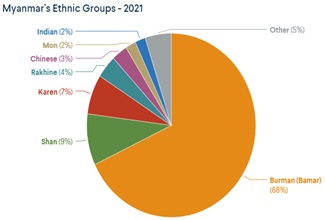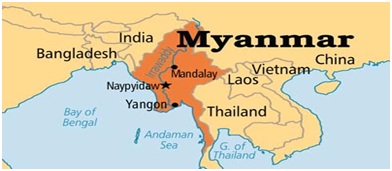

Weeks of demonstrations and a deadly crackdown have roiled Myanmar since a February coup brought back full military rule following years of quasi-democracy.
Context
Weeks of demonstrations and a deadly crackdown have roiled Myanmar since a February coup brought back full military rule following years of quasi-democracy.
Background
Myanmar, also known as Burma, has suffered decades of repressive military rule, poverty due to years of isolationist economic policies, and civil war with ethnic minority groups.
- 1948: Myanmar has been ruled by a military junta for many of the years since it gained independence from British colonial rule in 1948.
- The Union of Burma began as a parliamentary democracy, like most of its newly independent neighbors on the Indian subcontinent.
- 1962: But representative democracy only lasted until 1962, when General U Ne Win led a military coup and held power for the next twenty-six years.
- Ne Win instituted a new constitution in 1974 based on an isolationist policy and a socialist economic program that nationalized Burma’s major enterprises.
- 1988: By 1988, widespread corruption, rapid shifts in economic policy related to Myanmar’s currency, and food shortages led to massive student-led protests.
- In August 1988, the army cracked down on protesters,killing at least three thousand and displacing thousands more.
- In the aftermath of the 1988 crackdown, Ne Win resigned as chairman of his party, although he remained active behind the scenes as another military junta took power.
- 1989: In 1989, the new military regime changed the country’s name from the Union of Burma to the Union of Myanmar, and the capital, Rangoon, was renamed Yangon.
- 2005: In 2005, the military government moved the administrative capital to Nay Pyi Taw, a city it built-in central Myanmar.
- 2007: In 2007, the so-calledSaffron Revolution, widespread anti-government protests that were sparked by fuel price hikes and named after the saffron-colored robes worn by participating Buddhist monks—and international pressure prompted shifts in Myanmar.
- 2008: The junta pushed forward a new constitution in 2008, which is still in place today, that gave the military widespread powers even under civilian rule.
- The military junta unexpectedlyofficially dissolved in 2011 and established a civilian parliament for a transitional period, during which former army bureaucrat and Prime Minister Thein Sein was appointed president.
- 2015: Myanmar held its first nationwide, multiparty elections—considered to bethe freest and fairest elections in decades—since the country’s transition away from military rule.
- Suu Kyi became Myanmar’s de facto leader in 2015.
- 2021 February: Government overthrown in military coup.
|
The country profile
|
Analysis
What is happening now?
- In 2020, Myanmar held its second national elections under civilian rule, which Ms Suu Kyi’s NLD party overwhelmingly won.
- The military suffered a major blow in the elections: the USDP won just 33 of 476 available seats, while the NLD won 396.
- Military leaders alleged voter fraud, and after the country’s election commission rejected the military’s claims, itstaged a coup in February 2021.
- The military is now back in charge and has declared a year-long state of emergency.
- It seized control on 1 February following a general election which Ms Suu Kyi's NLD party won by a landslide.
- The coup took place as a new session of parliament was set to open.
|
Who is Aung San Suu Kyi?
|
What about ‘human rights’?
- The people of Myanmar, young and old, from all walks of life, have a vision: freedom, democracy and human rights.
- Human rights are natural rights which cannot be restrained by human laws. It includes Right to life, liberty and property.
- These are the requirements of a person to fully grow into a social being. Individuals are the fundamental contributors of the Nation. Only when their rights are protected they will be able to contribute the best of himself to the country.
- olden times fulfilling the country's law by any means was the end of a country. With time, people became the centrality of a Nation.
- Laws and public administrators now become the means to protect an individual’s interest from injustice. Towards such and end, international organizations such as UN was established.
|
Universal Declaration of human rights The United Nations Charter sets forth the "inherent dignity" and the "equal and inalienable rights of all members of the human family." Upholding these human rights principles as "the foundation of freedom, justice, and peace in the world" is fundamental to every undertaking of the United Nations. |
Why has Myanmar endured so many ethnic conflicts?
- Myanmar is a diverse country, with the state recognizing more than one hundred ethnic groups.
- Forming roughlytwo-thirds of the population, ethnic Burmans, known as the Bamar, have enjoyed a privileged position in society and hold a majority of government and military positions.
- Many ethnic minority groups, on the other hand, have faced systemic discrimination, a lack of economic opportunities and development in their regions, minimal representation in government, and abuses at the hands of the military.
- Since independence, discrimination has been ingrainedin Myanmar’s laws and political system.
- Anti-Muslim sentiment has alsobeen on the rise in predominantly Buddhist Myanmar.
- Buddhist extremists, who promote the supremacy of Buddhism, have attacked Muslims and spread hate speech.

Is the world moving towards dictatorship?
- Democracy now finds itself in a Hobbesian state (the natural condition of mankind), for people have willingly submitted themselves to the government in fear.
- Dictatorship often starts in the face of a threat. Earlier it was the invisible and distant threat of terrorism that demanded obedience, now the threat is closer to home – that is pushing people to give away their rights on a platter.
- The question is for how long.
- The imposition of any kind of emergency, formal or informal, without an expiry date spells doom for democracy.
What has been the International reaction?
Numerous countries have condemned the military takeover.
- US and UK: The United States and the United Kingdom have responded with sanctions on military officials.
- China: China blocked a UN Security Council statement condemning the coup, but has backed calls for the release of Ms. Suu Kyi and a return to democratic norms. The country has previously opposed international intervention in Myanmar.
- Southeast Asian countries have been pursuing diplomatic efforts to end the crisis.
What is India’s stand?
- India expressed “deep concern” over the reports of an unfolding military coup in Myanmar.
- India has always been steadfast in its support to the process of democratic transition in Myanmar.
- The country believes that the rule of law and the democratic process must be upheld.
- India had shown a commitment to building robust relationships with Myanmar over the past two decades which intensified after the democratic process began in 2011.
Conclusion
No one possesses a magic wand of solutions. But there is one consistent lesson, that no change is irreversible, particularly in a context where military leadership scripted the meaning of democracy, and domestic forces and geopolitics continuously fail to deter its actions and impulses to rule.



